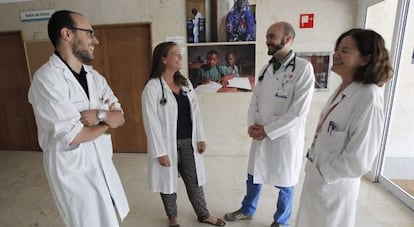Death was to be expected, say doctors who treated Ebola-infected priest
Team who looked after Miguel Pajares in Madrid say hardest part was lack of direct contact

The death of Spanish missionary Miguel Pajares from the Ebola virus in Madrid was “to be expected” even though doctors fought to save his life “to the very end,” medics who treated him at the capital’s Carlos III Hospital have said.
Speaking to news agency Efe about being the first doctors to treat an Ebola patient in Europe, tropical disease specialists Marta Arsuaga and Fernando de la Calle Prieto said that at first they hoped he might pull through despite the virus’s 80 percent mortality rate, since he was being treated in a more advanced health system.
For five days, the team managed to keep 75-year-old Pajares, who had been brought back to Spain after contracting the virus working in a hospital in Liberia, alive. “At that moment we all wanted him to pull through so badly ... but it is a very serious virus and the end was to be expected,” said Arsuaga.
Doctors have asked for the “utmost calm” from Spaniards
The hardest part about the treatment, she added, was the fact that they were unable to come into direct physical contact with the patient, as Ebola can spread through touch. This meant wearing special suits to perform tasks such as keeping Pajares clean and checking his vital signs.
Just putting on the suit took 15 minutes, and taking it off took even longer because great care had to be taken not to touch any part of it. Both operations were performed inside a security lock separating the “clean” area from the “dirty” area where Pajares fought the infection.
Weariness would set in every half an hour. “The more time you spend in there, the higher the risk of making a mistake. That is why there were so many personnel at hand,” said Arsuaga.
Patient and doctors communicated through an intercom system.
De la Calle Prieto added that even Pajares’ tissue samples could not be analyzed the usual way in a lab. This forced doctors to rely on other “signs” that are typically used in traditional medicine.
Just putting on the safety suit took 15 minutes, and taking it off even longer
Asked whether the priest should have remained in Liberia rather than risk spreading Ebola in Spain, the doctors said it had not been their decision to make.
“We came across a patient with Ebola and we did the job we are trained to do. Why he was brought over, or whether it was right or wrong, has to do with existing agreements,” says Arsuaga.
Doctors also asked for the “utmost calm” from Spaniards and said it was “highly unlikely” that another confirmed case of Ebola would be transferred to Spain, making the probability of the disease becoming infectious here “practically” zero.
As for the nun who was flown in along with Pajares, Juliana Bonoha, doctors have confirmed that so far she has not developed the disease and remains under close observation.
Tu suscripción se está usando en otro dispositivo
¿Quieres añadir otro usuario a tu suscripción?
Si continúas leyendo en este dispositivo, no se podrá leer en el otro.
FlechaTu suscripción se está usando en otro dispositivo y solo puedes acceder a EL PAÍS desde un dispositivo a la vez.
Si quieres compartir tu cuenta, cambia tu suscripción a la modalidad Premium, así podrás añadir otro usuario. Cada uno accederá con su propia cuenta de email, lo que os permitirá personalizar vuestra experiencia en EL PAÍS.
¿Tienes una suscripción de empresa? Accede aquí para contratar más cuentas.
En el caso de no saber quién está usando tu cuenta, te recomendamos cambiar tu contraseña aquí.
Si decides continuar compartiendo tu cuenta, este mensaje se mostrará en tu dispositivo y en el de la otra persona que está usando tu cuenta de forma indefinida, afectando a tu experiencia de lectura. Puedes consultar aquí los términos y condiciones de la suscripción digital.








































